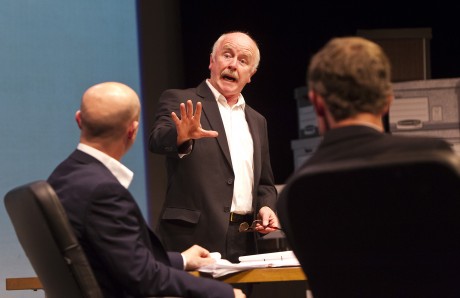
AUTHOR Colin Murphy brings his bailout docu-drama to An Grianán Theatre later this month. It’s likely to be the closest we’ll get to an actual banking enquiry so come along and reach your own verdict based on the evidence presented by Murphy and the team at Fishamble Theatre. Here’s what Murphy has to say on the subject.
The banking crisis has cost us €64 billion. People want accountability, and they’re afraid they’re not going to get it. But what if accountability was something they could contribute to themselves? Picture a packed “town hall” meeting in a local venue – say An Grianán. Fed up waiting for a public banking inquiry, a group of locals has decided to hold one themselves.
They’ve brought with them the official reports by Honohan, Nyberg and Regling and Watson; stacks of newspaper articles; books by some of the country’s best journalists. But it’s overwhelming. There’s simply too much material. And there’s way too much economics. Disheartened, they are about to give up.
“Wait!” someone shouts. “Let’s stage it! With a group of actors. Maybe it’ll make more sense if we can see it happening before us. We can start at the beginning and make scenes out of all the important moments. Maybe then it’ll make sense.”
A month later, they come back together to put the bankers, bureaucrats and politicians on stage. Decisions that seemed dry are now laden with tension. Characters they had dismissed as ignorant or incompetent appear as more complex human beings. For an hour, they watch the events that led to the bank guarantee unfold. And then they debate it, armed with fresh information and insight.
In ‘Guaranteed!’, the play I have written about the bank guarantee, which has been produced by Fishamble: The New Play Company and comes to An Grianán, Letterkenny on Nov 20, we’ve tried to short-cut this approach. The play is based on my investigation of the banking crisis and aims to tell that story as clearly and concisely as possible.
It’s a story in three acts. The first act gives us Sean Fitzpatrick rhapsodising about Anglo, the board of AIB scheming to increase their property lending and Bertie Ahern outbidding his rivals for votes in the general election. It’s all about what’s not happening on stage: no hard questions being asked, no proper investigation of the banks, no real response to the global credit crunch.
In the second act, we see the growing frenzy of September 2008, as Lehman’s collapses and banks around the world totter, the Irish banks with them. In Dublin, on September 29, the elite decision makers gather at Government Buildings to try to save Anglo, and with it, they hope, the Irish economy.
Like any good tragedy, we know what’s going to happen. The drama lies in seeing the characters trying to escape or ignore that fate, even as their actions bring it closer.
But there’s a third act, when the lights go up and the cast leaves, and a small panel comes on stage to discuss and debate with the audience. This is a key part of this “citizens’ inquiry”. In the play, the actors took the place of witnesses, telling us what happened. Now the audience takes the place of the jury. And the panel take the place of the barristers, helping the audience sift through the evidence.
The play took life over a year ago, when I suggested to Fishamble that I write a play about the banking crisis for them. It would consist largely of anonymous men in suits talking about “shorting” and liquidity, I said. The set would consist of file boxes and a screen for showing powerpoint presentations. There would be no music, no comedy, no sex, and no makey-uppy stuff… It wasn’t an obvious sell. But they went for it.
And when we premiered the play this summer, we touched a nerve. We sold out. The President came. The Governor of the Central Bank came. People were turned away. Every night, most of the audience stayed for the discussion – and would have stayed long into the night, had we not had to let the theatre staff go home.
Speaking on one of the panels, the businesswoman Glenna Lynch said people’s anger had led them to turn their back on politics: they had “leaned out,” she said. But what we need to do, she suggested, is “lean in.” We need to engage, to challenge, to make our voices heard, to demand better standards.
Leaning in means not simply despairing at the lack of accountability, but finding ways to hold people accountable for ourselves. The theatre has always done this: when Shakespeare was using his history plays to tell stories of contemporary politics, when Sean O’Casey was challenging the romanticism of the Easter Rising, when Arthur Miller put a corrupt American defence contractor on stage, just two years after the end of the Second World War (in All My Sons), they were each using the stage to hold the powerful to account.
It won’t get us back any of the €64 billion. But it may just help people understand how that decision was made. (It may, surprisingly, make people laugh along the way.) And that may provoke them to lean in, rather than lean out – to help make sure nothing like this ever happens again.
Guaranteed! by Fishamble The New Play Company is at An Grianán Theatre on Wed 20 Nov at 8pm. For further information log onto www.angrianan.com or call the box office on Tel 074 912 0777.









